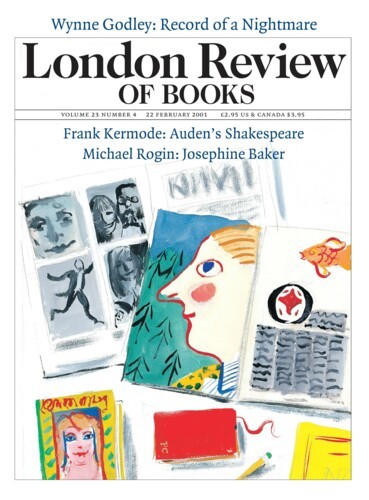Victor Pelevin, the internationally fêted bad boy of Russian fiction, whose 1993 collection of short stories, The Blue Lantern, has this month been reissued in English (Faber, £6.99), has a new rival. And I don’t mean Toby Litt, the John Calvin of the New Puritans, though the name of Jonson’s Zeal-of-the-land Busy also comes to mind, what with Litt’s latest 400-pager, deadkidsongs (Hamish Hamilton, £9.99) hitting the bookshops today, a mere 12 months after Corpsing came out. Litt, who has possibly the most suspiciously clever name for a novelist since Will Self, has been acclaimed by the Guardian as ‘one of the foremost young lions of British hip-lit’. An unsportingly anonymous Londoner, by contrast, sticking their neck out on amazon.co.uk, described Corpsing as ‘a waste of a perfectly good tree’, adding: ‘Penguin should be thoroughly ashamed of itself . . . If this is the future of Brit Lit, gawd help us all.’
Be that as it may, Pelevin should anyway be looking over his other shoulder, as the comic-strip Anna Karenina blasts its way into the 21st century, to a generally horrified reception. Ilya Tolstoy, the novelist’s great-great-grandson, has said he can’t believe it’s a serious project. Even though most of the words are apparently taken from the book, the drawings have updated the story to contemporary post-Soviet Russia, complete with sushi bars, strip clubs, cocaine and mobile phones. There has been a certain amount of disagreement in Western press reports of the cartoon’s publication. Some said that the comic’s author, Katya Metelitsa, insisted she was inspired by admiration for the novel, and quoted her as saying: ‘I think Tolstoy would have approved.’ According to other sources, however, Metelitsa has said: ‘Personally, I hate Tolstoy. He provokes a deep enmity in me. He loved Anna but could hardly have killed her off more coldly.’ And it’s certainly the case that the executing train in her version – the drawings are by Valery Kachaev and Igor Sapozhkov – has the name ‘Lev Tolstoy’ embossed on its engine.
One reason for the cartoon’s chilly critical reception in Russia may be that the medium is relatively unfamiliar there: Anna Karenina has been claimed as the nation’s first ‘serious’ comic book – next up, apparently, is a cyber-punk Queen of Spades. France might appear to offer the most obvious antithesis to the situation in Russia, the bande dessinée being a relatively respectable art form there. But when Stéphane Heuet’s pretty faithful adaptation of the first volume of Proust came out in the autumn of 1998, it was described by the Figaro as ‘cruel’, ‘horrible’, ‘catastrophic’, ‘blasphemous’ and ‘prodigiously inane’. And the most critically popular recent example of this sort of thing that I can think of is Posy Simmonds’s Gemma Bovery – her impartial colleague Francis Wheen suggested it should have won the Booker Prize. All of which would seem to suggest that it’s fine to do it as long as you do it with some other country’s literature.
The infiltration of ex-KGB mafiosi, envoys from the Russia of Metelitsa’s Anna Karenina, into London’s criminal underworld is held up, in the publicity material for Jocelyn Bain Hogg’s new book of photographs, The Firm (Westzone, £40), as one of the reasons ‘the face of the British gangster is changing.’ But Mad Frankie Fraser and Bruce Reynolds – both of whom have recently written memoirs – aren’t the only old crooks being forced to change their ways, if we are to believe Denise Deegan, whose Managing Activism: A Guide to Dealing with Activists and Pressure Groups was published in January (Kogan Page, £14.99). Deegan ‘runs a specialist healthcare PR agency in Dublin, where her clients include several leading international pharmaceutical companies’. The press release for the book explains in a gloomy tone that ‘activists are more powerful than ever; they represent an increasing threat to organisations’ reputation and legal action against them can result in huge financial losses. For example, the famous McLibel trial against two London Greenpeace activists lasted from 1994 to 1997 and cost the fast food chain £10 million’ – that sum only sounds big until it’s considered in relation to McDonald’s profits, which are somewhere in the region of a billion dollars a year. ‘Unfortunately,’ Deegan says, ‘ignoring groups increases their determination,’ so they need to be ‘dealt with in the right manner’. The book may be cynical, but at least it’s a sign that complaining loudly does have an effect.
Managing Activism is given a run for its money by Tolley’s Charity Investigations (Butterworths, £58.95), which ‘prevents charities from being caught out by an official investigation’ from a body such as the Inland Revenue or the Charity Commission, which may probe charities’ ‘methods of fundraising, the ways in which their funds are used, the maintenance of proper accounting records and the payments to trustees’. You might like to think that a charity worthy of the name need have nothing to fear from such an investigation, but on further reflection, no doubt the ones that deserve to be shafted never are – public schools inevitably loom into view – and it’s the smaller charities that get caught out because they simply don’t know the rules. I wonder if spending £58.95 on a guide to avoiding investigation would count as a valid use of funds; it’s likely, at any rate, to encourage the auditors to look very closely indeed.
Send Letters To:
The Editor
London Review of Books,
28 Little Russell Street
London, WC1A 2HN
letters@lrb.co.uk
Please include name, address, and a telephone number.

